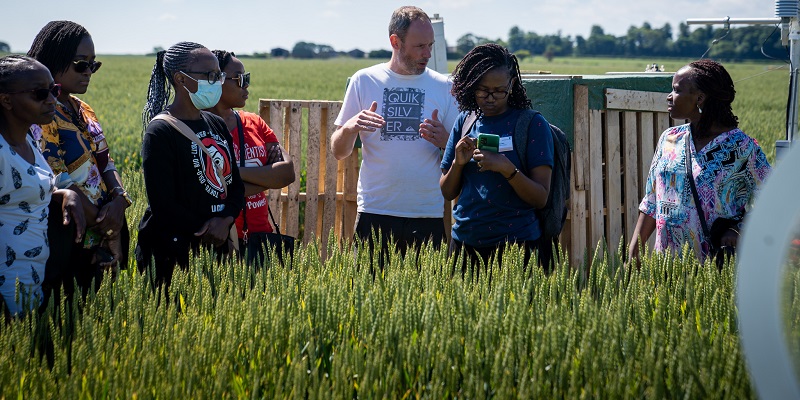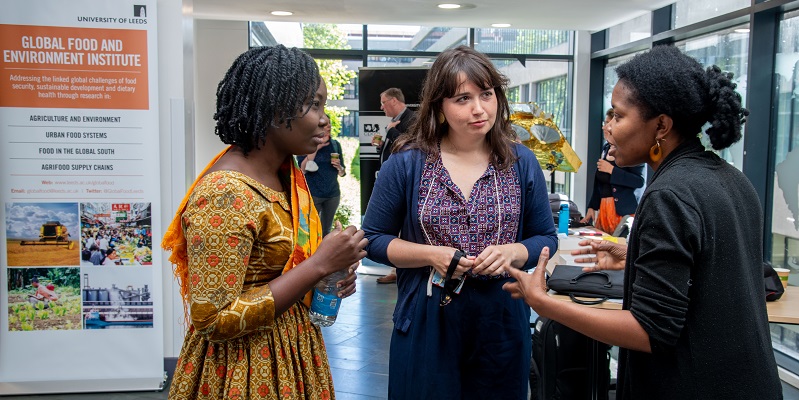Fellows from six African countries this week joined colleagues at Leeds to strengthen networks and build research and leadership skills, helping to bring sustainable change in African food systems.
The Food Systems Research Network for Africa (FSNet-Africa) works with early-career researchers in Ghana, Kenya, Malawi, South Africa, Tanzania and Zambia. The aim is to build capacity for African food systems research and develop policy solutions and practical interventions to support the United Nation's Sustainable Development Goal targets.
The FSNet-Africa summer school runs from 20 June to 1 July at the University, with 20 fellows and 40 mentors invited to participate in a programme that will focus on training aspects such as interdisciplinary research, policy advocacy, academic leadership.
This includes exploring areas such as skills training on food innovation and entrepreneurship, visiting the University farm to discuss the farm's key activities and receive at tour of our environmental observatory, as well as learning how to create impact from research.
It's through this kind of collaboration that we can build research capacity on the ground to provide solutions where they are the most needed.
Professor Claire Quinn is FSNet-Africa project leader at Leeds and part of the Sustainability Research Institute. She said: "The FSNet-Africa summer school programme is a great opportunity to bring together talented interdisciplinary researchers whose work will ultimate contribute to creating climate-smart, nutrition-sensitive and poverty-reducing solutions for the African continent.
"The programme embodies the University's commitment to create equitable international partnerships. It's through this kind of collaboration that we can build research capacity on the ground to provide solutions where they are the most needed."

The Leeds summer school programme is a follow-up to the first summer school and research symposium that was held online and at the University of Pretoria in South Africa, in January 2022.
Professor Frans Swanepoel is FSNet-Africa project leader at Pretoria. He said: "It is exciting that we have reached this stage, the second summer school hosted at the UoL this week in the FSNet-Africa fellowship programme.
"All the research triads have developed their research proposals and will soon start implementing research, which will provide solutions to complex challenges and provide research evidence and innovations for and with food systems stakeholders in the Global South, the participating African countries in particular. This means that their research also has a much higher chance of being taken up and rolled out."
The summer school gives participants the chance to engage in discussion with academic researchers from various disciplines, allowing them to network and develop future collaborations.
"The networking has helped me learn of the recent advancements in food systems research. Most importantly, is the engagement with my mentor from the University of Leeds that has helped me shape my research project to be implemented in Malawi."
Dr Bridget Bwalya Umar, FSNet fellow from the University of Zambia, said: "I was very impressed to learn about interdisciplinary, innovative and topical research that the Global Food and Environment Institute is engaged in. It resonated with my research interests. I look forward to discussions with the researchers involved on possible future collaborations."

Dr Frank Tchuwa, FSNet fellow from the Lilongwe University of Agriculture and Natural Resources, said: "The summer school has been a very exciting experience. I have had the opportunity to interact with researchers from the University of Leeds and other African Universities such as the University of Ghana and Pretoria.
"The networking has helped me learn of the recent advancements in food systems research. Most importantly, is the engagement with my mentor from the University of Leeds that has helped me shape my research project to be implemented in Malawi."
The three lead partners in the FSNet-Africa project are the University of Leeds, the University of Pretoria, and the Food, Agriculture and Natural Resources Policy Analysis Network (FANRPAN).
The lead partners were selected based on their strengths in food systems research and their current partnerships and networks with higher education and research institutions, policymakers, private sector stakeholders, and grassroots organisations.
Dr Tshilidzi Madzivhandila, CEO of FANRPAN, said: "In the FSNet-Africa project, FANRPAN has partnered with the Universities of Pretoria and Leeds to strengthen interdisciplinary food systems research, and most importantly, to ensure that the translation of co-produced research evidence informs practice, decisions and policies for meaningful agricultural transformation and wider impact".






